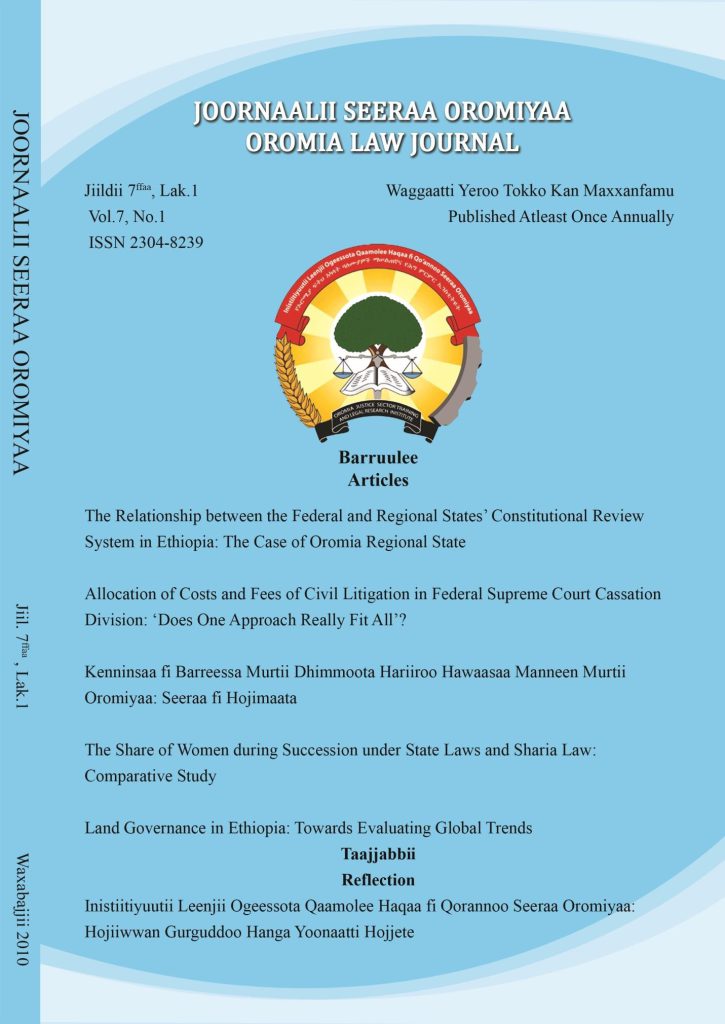Oromia Law Journal
Published since 2012
ESSN
ISSN 2304-8239 _________________________________________________________________
Current Issue
Vol.9,No.1 |
Joornalii Seeraa Oromiyaa Jiil.9,Lak.1
Feature Articles |
Joornalii Seeraa Oromiyaa Jiil.8,Lak.1

Current Issue

Vol.9,No.1
Joornalii Seeraa Oromiyaa Jiil.9,Lak.1

Vol.9,No.1
Joornalii Seeraa Oromiyaa Jiil.9,Lak.1

Vol.7,No.1
Joornalii Seeraa Oromiyaa Jiil.9,Lak.1
About Oromia Law Journal
Oromia Law Journal (OLJ), a journalhosted by Oromia Justice Sector Professionals Training and Legal Research Institute, is annually published journal. It is indexed on African Journals Online and Heinonline. It is also one of the sixteen journals in Ethiopia having first National Accreditation by Ministry of Science and Higher Education in 2020. Its editors are also members to Ethiopian Journal Editors’ Forum. It accepts and publishes submissions fulfilling the following criteria upon revisions by the editors and approval by the Preparatory Board.
Submission Guidelines
Submissions should be articles (not published elsewhere) related to legal, economic, political and social issues arising in relation to Oromian, Ethiopian, and other related International Laws. Contributions could also be other works such as essays, comments on legislation, book reviews, and court cases (with or without comments). Contributions may be submitted in Afan Oromo, English or Amharic Submissions shall be computer typed, 1.5 space, in 12 font, Times New Roman; foot notes in 10 font, 1.0 space, Times New Roman (for Afan Oromo & English). These considerations also work for Amharic submissions except that the font size for footnote is 9. The length of a contribution shall not exceed 30 pages for articles and essays. Other contributions like book reviews, case comments, etc shall range from five to ten pages. The contribution should be organized into title page, abstract, introduction, body and conclusion.

Vol.9,No.1
A short description of the service and how the visitor will benefit from it.

Vol.8,No.1
A short description of the service and how the visitor will benefit from it.

Vol.7,No.1
A short description of the service and how the visitor will benefit from it.

Vol.6,No.1
A short description of the service and how the visitor will benefit from it.
Vision and Mission
Vision of Our Institute
To be Center of excellence in legal training, legal research and legal consultancy services and become the best center in Ethiopia competent in East Africa and famous in African contienent by the year 2022.
Mission of our Institute
To contribute for continuous justice and legal reform of the region by delivering pre-service and in-service training so as to fill the justice system with competent and ethical professionals; by conducting problem solving doctrinal and non-doctrinal legal research; and by giving need based consultancy service on law.
Functions of Oromia Justice Sector Professionals Training and Legal Research Institute
The major activities of the Institute can be broadly categorized into two core processes: legal training and consultancy services on the one hand and legal research and publication services on the other. The training core process is aims at helping the justice sector professionals adhere to the highest standards of personal and official conduct and acquire the skills, knowledge and attitude required to perform their responsibilities fairly, correctly and efficiently. This process has two forms of training programs: initial /pre-service/ training and in-service training. By the initial training, which presupposes a technical training mainly of practical skills, the Institute trains judges and prosecutors who will be operational on leaving this initial training program. Beyond that, the training program also focuses on the essential ethical and attitudinal underpinnings the judges and prosecutors are to be steeped in to hold the position of judge or prosecutor. On the other hand, the Institute gives in-service trainings. The goals assigned to in-service training include: refreshing or updating knowledge and skills, keeping abreast of changes in legislation and practice, preparing for the performance of new duties, sharing good practices and promoting self development, providing a forum for reflectionon important issues, etc.
